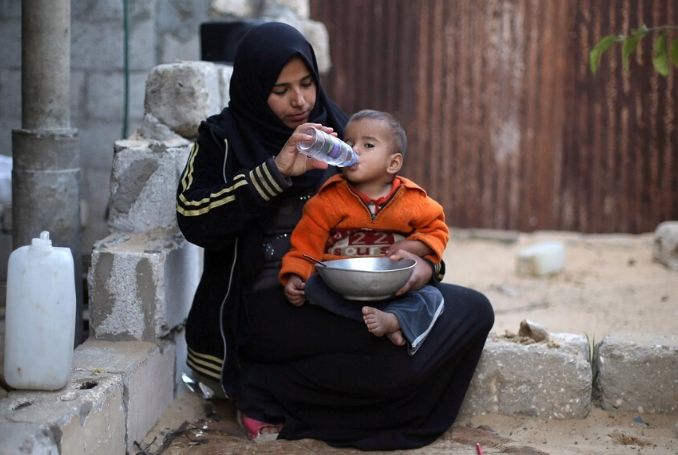
By Rana Shubair
It’s almost sunset. I stand at my living room window trying to catch a last glimpse of the red horizon as the sun absorbs the last flicker of sunlight. It’s oddly quiet. I think to myself, “Oh, how peaceful it would be to have this peace and serenity every day. What would our lives be like if we never had to worry about something attacking us from above?”
The atmosphere is so peaceful that it’s hard to imagine it could suddenly be disrupted by an Israeli warplane or the incessant buzzing of drones. Gazing at the sky, I make a prayer that peace and security spread over my people. It’s a wish that many nations across the globe may take for granted, but this is not the case for the people of Gaza.
How priceless can peace be .. how sublime. Two days of attacks in early November of this year eradicated all the beauty I constantly try to hold on to. Massive bombing day and night, horrific explosions shaking the houses and the hearts of people. Anyone could be a target. Everyone is in the range of danger. There’s no safe place.
My life timeline floated before me. I’ve grown up under occupation and attacks all my life. Not only that but my parents and grandparents as well. The only beautiful memories I have are those of my early childhood when all I cared about was food and play. It was a carefree life by all means, yet some childhood memories still haunt me.
I clearly remember an incident when I saw Israeli occupation soldiers topping a barricaded wall which I had to pass through to get to my grandparent’s house. My childhood mind told me that if I passed that wall safely, everything would be alright as if the danger would be gone, but only gone until I had to pass that day.
Growing up in Gaza lacks the luxuries of childhood itself. Although my first couple of years of childhood were under Israeli occupation back in the mid-1980s, I could still enjoy playing and having fun. But it seemed that there was always this dormant feeling inside of an impending intruder barging in unexpectedly. This was solidified by the conversation grownups had which I tried to digest but failed to grasp the whole picture back then.
Now, raising my own children under a new kind of aggression, it’s sad to see how they have had to endure living under constant threat of attacks and being blockaded on a tiny piece of land. If parents in other parts of the world are challenged by naughty children who refuse to drink their milk in the morning or reckless teenagers who hang out with bad people, then I can say the parents of Gaza have completely different types of challenges to face.
Being deprived of visiting other cities in their own country, Palestine has further added anguish to their minds. “Mom, why can’t we visit Jerusalem?” or having a tantrum of: “I don’t wanna see pictures of Palestine. I wanna go there and see for myself!” And the worst of all was: “Mom, do we live in Gaza or Palestine?”
To them, they hear conversations about the circumstances we live under from the old and young, teachers and parents, aunts, uncles, cousins and the school janitor. The harsh reality forced upon them is mind-boggling in the way it infiltrates into every facet of their lives. I constantly try to salvage what is left of their childhood. Sometimes I win; many times, it seems too late.
“Why should I go to university if I won’t get a job when I graduate?” asks my 13-year-old son as I scold him for not studying hard enough. In a desperate attempt to console him, I try to sound assuring: “When that time comes, things will have changed for the better inshallah.”
Waking up to the sound of warplanes bombings, being agonized by the incessant buzzing of drones day and night, suffering the power outages, and contaminated beach and undrinkable water are a few of the reasons why life in Gaza has become unlivable.
When I heard the UN report stating that Gaza will become unlivable by 2020, I was somewhat skeptical. But having already seen it firsthand has turned this into a bad reality that’s too palpable to ignore.
Gaza is situated along the Mediterranean Sea, something that should give us the luxury of a heavenly blue beach. However, when I go to the beach, I can see the contaminated shoreline which has turned the water into a filthy green making it an intolerable suffocating sight.
The recurrent attacks on Gaza which could happen at any time of day or night have made even small things like family outings unstable and meaningless. You can’t go out for a day without having to keep your phone beside you in case something somewhere across Gaza Strip happens. For even if it’s far away, rippling effects would soon spread throughout the whole of Gaza.
Do I see any light coming in through the small cracks of the Gaza open-air prison? Can my eyes glimpse a hint of that light at the end of the dark cavernous tunnel? I know for a fact that nations built on injustice may live for decades, but will eventually tumble down and vanish.
Superpowers are siding with injustice and suffering continues to be inflicted upon the Palestinians. Their sin? They’ve been demanding the right to live in freedom and dignity. They want to return to the lands that were stolen from them in 1948. They ask for the international community to hold Israeli occupation accountable for war crimes they’ve been committing for the past seventy plus years.
It didn’t take long for the International Criminal Court (ICC) to indict the Serbian leader Slobodan Milošević for genocide and war crimes while Israeli war criminals continue to enjoy impunity and have never been held accountable. They demand that the Israeli occupation state complies with UN resolution 194 on the Right of Return.
Yet, no matter how tangible this situation is already, I still have this tremendous hope that things will change for us. Faith and hope are stealthy weapons that go hand in hand with working hard.
– Rana Shubair is a Gaza-based activist and writer. She is the author of “In Gaza, I Dare to Dream” and “ My Lover is a Freedom Fighter.” She has published works on WeAreNotNumbers and Mondoweiss.







